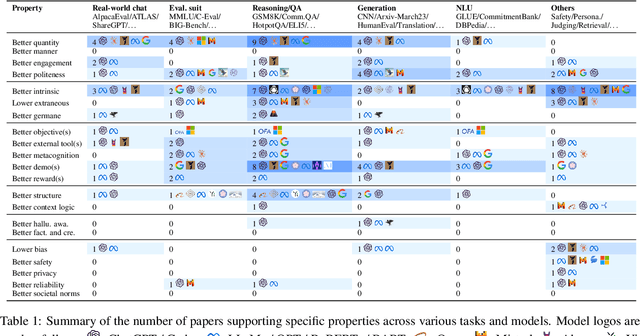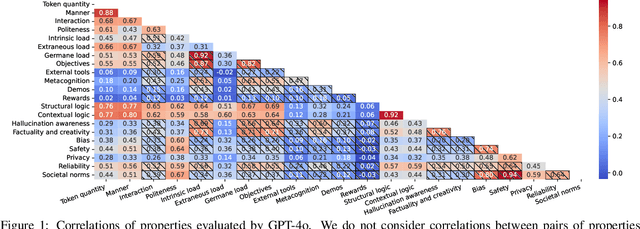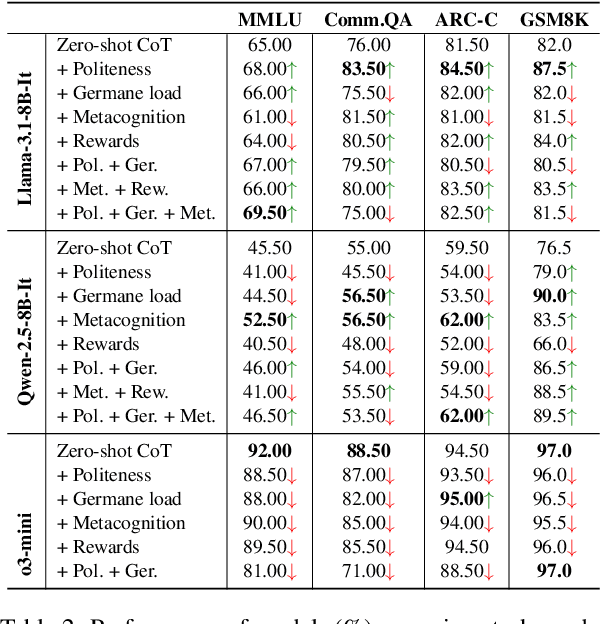Shafiq Joty
Gradually Compacting Large Language Models for Reasoning Like a Boiling Frog
Feb 04, 2026Abstract:Large Language Models (LLMs) have demonstrated impressive reasoning capabilities, but their substantial size often demands significant computational resources. To reduce resource consumption and accelerate inference, it is essential to eliminate redundant parameters without compromising performance. However, conventional pruning methods that directly remove such parameters often lead to a dramatic drop in model performance in reasoning tasks, and require extensive post-training to recover the lost capabilities. In this work, we propose a gradual compacting method that divides the compression process into multiple fine-grained iterations, applying a Prune-Tune Loop (PTL) at each stage to incrementally reduce model size while restoring performance with finetuning. This iterative approach-reminiscent of the "boiling frog" effect-enables the model to be progressively compressed without abrupt performance loss. Experimental results show that PTL can compress LLMs to nearly half their original size with only lightweight post-training, while maintaining performance comparable to the original model on reasoning tasks. Moreover, PTL is flexible and can be applied to various pruning strategies, such as neuron pruning and layer pruning, as well as different post-training methods, including continual pre-training and reinforcement learning. Additionally, experimental results confirm the effectiveness of PTL on a variety of tasks beyond mathematical reasoning, such as code generation, demonstrating its broad applicability.
MAS-ProVe: Understanding the Process Verification of Multi-Agent Systems
Feb 03, 2026Abstract:Multi-Agent Systems (MAS) built on Large Language Models (LLMs) often exhibit high variance in their reasoning trajectories. Process verification, which evaluates intermediate steps in trajectories, has shown promise in general reasoning settings, and has been suggested as a potential tool for guiding coordination of MAS; however, its actual effectiveness in MAS remains unclear. To fill this gap, we present MAS-ProVe, a systematic empirical study of process verification for multi-agent systems (MAS). Our study spans three verification paradigms (LLM-as-a-Judge, reward models, and process reward models), evaluated across two levels of verification granularity (agent-level and iteration-level). We further examine five representative verifiers and four context management strategies, and conduct experiments over six diverse MAS frameworks on multiple reasoning benchmarks. We find that process-level verification does not consistently improve performance and frequently exhibits high variance, highlighting the difficulty of reliably evaluating partial multi-agent trajectories. Among the methods studied, LLM-as-a-Judge generally outperforms reward-based approaches, with trained judges surpassing general-purpose LLMs. We further observe a small performance gap between LLMs acting as judges and as single agents, and identify a context-length-performance trade-off in verification. Overall, our results suggest that effective and robust process verification for MAS remains an open challenge, requiring further advances beyond current paradigms. Code is available at https://github.com/Wang-ML-Lab/MAS-ProVe.
Least-Loaded Expert Parallelism: Load Balancing An Imbalanced Mixture-of-Experts
Jan 23, 2026Abstract:Mixture-of-Experts (MoE) models are typically pre-trained with explicit load-balancing constraints to ensure statistically balanced expert routing. Despite this, we observe that even well-trained MoE models exhibit significantly imbalanced routing. This behavior is arguably natural-and even desirable - as imbalanced routing allows models to concentrate domain-specific knowledge within a subset of experts. Expert parallelism (EP) is designed to scale MoE models by distributing experts across multiple devices, but with a less-discussed assumption of balanced routing. Under extreme imbalance, EP can funnel a disproportionate number of tokens to a small number of experts, leading to compute- and memory-bound failures on overloaded devices during post-training or inference, where explicit load balancing is often inapplicable. We propose Least-Loaded Expert Parallelism (LLEP), a novel EP algorithm that dynamically reroutes excess tokens and associated expert parameters from overloaded devices to underutilized ones. This ensures that all devices complete their workloads within the minimum collective latency while respecting memory constraints. Across different model scales, LLEP achieves up to 5x speedup and 4x reduction in peak memory usage compared to standard EP. This enables faster and higher-throughput post-training and inference, with ~1.9x faster for gpt-oss-120b. We support our method with extensive theoretical analysis and comprehensive empirical evaluations, including ablation studies. These results illuminate key trade-offs and enable a principled framework for hardware-specific hyper-parameter tuning to achieve optimal performance.
MAS-Orchestra: Understanding and Improving Multi-Agent Reasoning Through Holistic Orchestration and Controlled Benchmarks
Jan 21, 2026Abstract:While multi-agent systems (MAS) promise elevated intelligence through coordination of agents, current approaches to automatic MAS design under-deliver. Such shortcomings stem from two key factors: (1) methodological complexity - agent orchestration is performed using sequential, code-level execution that limits global system-level holistic reasoning and scales poorly with agent complexity - and (2) efficacy uncertainty - MAS are deployed without understanding if there are tangible benefits compared to single-agent systems (SAS). We propose MAS-Orchestra, a training-time framework that formulates MAS orchestration as a function-calling reinforcement learning problem with holistic orchestration, generating an entire MAS at once. In MAS-Orchestra, complex, goal-oriented sub-agents are abstracted as callable functions, enabling global reasoning over system structure while hiding internal execution details. To rigorously study when and why MAS are beneficial, we introduce MASBENCH, a controlled benchmark that characterizes tasks along five axes: Depth, Horizon, Breadth, Parallel, and Robustness. Our analysis reveals that MAS gains depend critically on task structure, verification protocols, and the capabilities of both orchestrator and sub-agents, rather than holding universally. Guided by these insights, MAS-Orchestra achieves consistent improvements on public benchmarks including mathematical reasoning, multi-hop QA, and search-based QA. Together, MAS-Orchestra and MASBENCH enable better training and understanding of MAS in the pursuit of multi-agent intelligence.
Aligning Text, Code, and Vision: A Multi-Objective Reinforcement Learning Framework for Text-to-Visualization
Jan 08, 2026Abstract:Text-to-Visualization (Text2Vis) systems translate natural language queries over tabular data into concise answers and executable visualizations. While closed-source LLMs generate functional code, the resulting charts often lack semantic alignment and clarity, qualities that can only be assessed post-execution. Open-source models struggle even more, frequently producing non-executable or visually poor outputs. Although supervised fine-tuning can improve code executability, it fails to enhance overall visualization quality, as traditional SFT loss cannot capture post-execution feedback. To address this gap, we propose RL-Text2Vis, the first reinforcement learning framework for Text2Vis generation. Built on Group Relative Policy Optimization (GRPO), our method uses a novel multi-objective reward that jointly optimizes textual accuracy, code validity, and visualization quality using post-execution feedback. By training Qwen2.5 models (7B and 14B), RL-Text2Vis achieves a 22% relative improvement in chart quality over GPT-4o on the Text2Vis benchmark and boosts code execution success from 78% to 97% relative to its zero-shot baseline. Our models significantly outperform strong zero-shot and supervised baselines and also demonstrate robust generalization to out-of-domain datasets like VIS-Eval and NVBench. These results establish GRPO as an effective strategy for structured, multimodal reasoning in visualization generation. We release our code at https://github.com/vis-nlp/RL-Text2Vis.
SweRank+: Multilingual, Multi-Turn Code Ranking for Software Issue Localization
Dec 23, 2025Abstract:Maintaining large-scale, multilingual codebases hinges on accurately localizing issues, which requires mapping natural-language error descriptions to the relevant functions that need to be modified. However, existing ranking approaches are often Python-centric and perform a single-pass search over the codebase. This work introduces SweRank+, a framework that couples SweRankMulti, a cross-lingual code ranking tool, with SweRankAgent, an agentic search setup, for iterative, multi-turn reasoning over the code repository. SweRankMulti comprises a code embedding retriever and a listwise LLM reranker, and is trained using a carefully curated large-scale issue localization dataset spanning multiple popular programming languages. SweRankAgent adopts an agentic search loop that moves beyond single-shot localization with a memory buffer to reason and accumulate relevant localization candidates over multiple turns. Our experiments on issue localization benchmarks spanning various languages demonstrate new state-of-the-art performance with SweRankMulti, while SweRankAgent further improves localization over single-pass ranking.
LiveResearchBench: A Live Benchmark for User-Centric Deep Research in the Wild
Oct 16, 2025Abstract:Deep research -- producing comprehensive, citation-grounded reports by searching and synthesizing information from hundreds of live web sources -- marks an important frontier for agentic systems. To rigorously evaluate this ability, four principles are essential: tasks should be (1) user-centric, reflecting realistic information needs, (2) dynamic, requiring up-to-date information beyond parametric knowledge, (3) unambiguous, ensuring consistent interpretation across users, and (4) multi-faceted and search-intensive, requiring search over numerous web sources and in-depth analysis. Existing benchmarks fall short of these principles, often focusing on narrow domains or posing ambiguous questions that hinder fair comparison. Guided by these principles, we introduce LiveResearchBench, a benchmark of 100 expert-curated tasks spanning daily life, enterprise, and academia, each requiring extensive, dynamic, real-time web search and synthesis. Built with over 1,500 hours of human labor, LiveResearchBench provides a rigorous basis for systematic evaluation. To evaluate citation-grounded long-form reports, we introduce DeepEval, a comprehensive suite covering both content- and report-level quality, including coverage, presentation, citation accuracy and association, consistency and depth of analysis. DeepEval integrates four complementary evaluation protocols, each designed to ensure stable assessment and high agreement with human judgments. Using LiveResearchBench and DeepEval, we conduct a comprehensive evaluation of 17 frontier deep research systems, including single-agent web search, single-agent deep research, and multi-agent systems. Our analysis reveals current strengths, recurring failure modes, and key system components needed to advance reliable, insightful deep research.
DashboardQA: Benchmarking Multimodal Agents for Question Answering on Interactive Dashboards
Aug 24, 2025Abstract:Dashboards are powerful visualization tools for data-driven decision-making, integrating multiple interactive views that allow users to explore, filter, and navigate data. Unlike static charts, dashboards support rich interactivity, which is essential for uncovering insights in real-world analytical workflows. However, existing question-answering benchmarks for data visualizations largely overlook this interactivity, focusing instead on static charts. This limitation severely constrains their ability to evaluate the capabilities of modern multimodal agents designed for GUI-based reasoning. To address this gap, we introduce DashboardQA, the first benchmark explicitly designed to assess how vision-language GUI agents comprehend and interact with real-world dashboards. The benchmark includes 112 interactive dashboards from Tableau Public and 405 question-answer pairs with interactive dashboards spanning five categories: multiple-choice, factoid, hypothetical, multi-dashboard, and conversational. By assessing a variety of leading closed- and open-source GUI agents, our analysis reveals their key limitations, particularly in grounding dashboard elements, planning interaction trajectories, and performing reasoning. Our findings indicate that interactive dashboard reasoning is a challenging task overall for all the VLMs evaluated. Even the top-performing agents struggle; for instance, the best agent based on Gemini-Pro-2.5 achieves only 38.69% accuracy, while the OpenAI CUA agent reaches just 22.69%, demonstrating the benchmark's significant difficulty. We release DashboardQA at https://github.com/vis-nlp/DashboardQA
The Emergence of Abstract Thought in Large Language Models Beyond Any Language
Jun 11, 2025Abstract:As large language models (LLMs) continue to advance, their capacity to function effectively across a diverse range of languages has shown marked improvement. Preliminary studies observe that the hidden activations of LLMs often resemble English, even when responding to non-English prompts. This has led to the widespread assumption that LLMs may "think" in English. However, more recent results showing strong multilingual performance, even surpassing English performance on specific tasks in other languages, challenge this view. In this work, we find that LLMs progressively develop a core language-agnostic parameter space-a remarkably small subset of parameters whose deactivation results in significant performance degradation across all languages. This compact yet critical set of parameters underlies the model's ability to generalize beyond individual languages, supporting the emergence of abstract thought that is not tied to any specific linguistic system. Specifically, we identify language-related neurons-those are consistently activated during the processing of particular languages, and categorize them as either shared (active across multiple languages) or exclusive (specific to one). As LLMs undergo continued development over time, we observe a marked increase in both the proportion and functional importance of shared neurons, while exclusive neurons progressively diminish in influence. These shared neurons constitute the backbone of the core language-agnostic parameter space, supporting the emergence of abstract thought. Motivated by these insights, we propose neuron-specific training strategies tailored to LLMs' language-agnostic levels at different development stages. Experiments across diverse LLM families support our approach.
What Makes a Good Natural Language Prompt?
Jun 07, 2025



Abstract:As large language models (LLMs) have progressed towards more human-like and human--AI communications have become prevalent, prompting has emerged as a decisive component. However, there is limited conceptual consensus on what exactly quantifies natural language prompts. We attempt to address this question by conducting a meta-analysis surveying more than 150 prompting-related papers from leading NLP and AI conferences from 2022 to 2025 and blogs. We propose a property- and human-centric framework for evaluating prompt quality, encompassing 21 properties categorized into six dimensions. We then examine how existing studies assess their impact on LLMs, revealing their imbalanced support across models and tasks, and substantial research gaps. Further, we analyze correlations among properties in high-quality natural language prompts, deriving prompting recommendations. We then empirically explore multi-property prompt enhancements in reasoning tasks, observing that single-property enhancements often have the greatest impact. Finally, we discover that instruction-tuning on property-enhanced prompts can result in better reasoning models. Our findings establish a foundation for property-centric prompt evaluation and optimization, bridging the gaps between human--AI communication and opening new prompting research directions.
 Add to Chrome
Add to Chrome Add to Firefox
Add to Firefox Add to Edge
Add to Edge